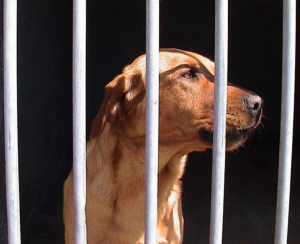Boarding and training is not always the best option to stop aggression in dogs
There is a whole crop of trainers that believes they can end all aggression in your dog, RIGHT NOW!, if only you sign up for a training package and drop your dog off. You might even be tempted to do so. First, you think who better to stop a terrible problem with your dog than a professional. Second, you might think they are more skilled and so it would be better for them to handle the dog. Third, you might be afraid of working with the dog or just don’t want to.

So, what’s the problem with using a board and train option for your aggressive dog?
There are actually quite a few issues with using board and train programs:
1. Aggression is often situation specific. The dog might easily display signs of aggression within your home or in a situation that you routinely expose the dog to, but this same issue may not even present itself in a the training location where everything is different.
2. Training bonds a dog to the handler. This is true whether you are working on basic obedience commands or more fine tuned training. The dog might become very keen to the handler working with the dog but not translate the skills as easily to the owner.
3. How long is the training program? Most aggression issues take time and patience to work through, and the bulk of training programs are only 2-4 weeks in length. This isn’t usually enough time to ‘cure’ an aggression issue. If the trainer claims it is, you need to know how the trainer intends to work with the problem.
4. Trainers are more skilled than the average dog owner. What that means from a board and train standpoint is that you may not be able to fully take on the skills the dog has been trained to do because you aren’t as skilled as the trainer. It is best, especially when working with behavioral issues, to make sure that the training program is something you feel fully comfortable handling on a daily basis.
5. As mentioned earlier, aggression is situation specific. This could mean that if you opt to board and train the dog, the aggression may reappear when the dog is back home and with you. Any training protocol should closely evaluate how the environment works into the problem.
What is the best way to train an aggressive dog?
Really, the best way to work with an aggressive dog is one-on-one with a trainer but do so within your home with you as the handler.
What this allows is for the trainer to see what is happening as it actually occurs within your home, in the environment that causes the issue. This way the trainer doesn’t have to go on just hearing what happens but is likely to see what happens too. This allows the trainer to develop a behavior modification plan that takes into account the current environment the dog lives in, make suggestions about how to alter the environment to set the dog up for success, and to also give you an idea on prognosis. There are times when no matter how much training goes into a dog, perhaps it would be better in a different home. This is most true in cases of dog-to-dog fighting within the home or when children are present.
Trainers that work with you in your home are more readily available to answer questions, visit with you about your concerns, make suggestions and change plans if one method isn’t working for you in your home, etc. This is all very important when working with an aggressive dog. You don’t want to feel all on your own on this journey!
Involve your vet
Keep your veterinarian involved in the journey as well. Any time you are dealing with aggression, it is normally recommended that you have your veterinarian do a wellness exam and make sure there isn’t an underlying medical issue that relates to the aggression. Additionally, there are cases of aggression that do benefit from medical supplementation with human drug therapies (for anti-anxiety and anti-depressant). These medications don’t solve a problem but can greatly enhance the behavior modification process, and only your veterinarian can prescribe them.
When you work one-on-one with a trainer, you can take those evaluations directly to your veterinarian to determine what medication would be best in your situation for your dog. There are numerous options, but they don’t all work the same and not all will benefit your particular dog. A skilled dog behavior expert can offer suggestions and provide you with a report to give your veterinarian about what is occurring to best judge the right medications.
Final thoughts
While board and train can be a good training option for some people and some dogs in terms of basic obedience and manners, it generally is not the best option when dealing with more complicated behavioral issues. Instead, take the time to find a qualified dog behavior specialist that will work with you as the handler and show you exactly how to work with your dog.
